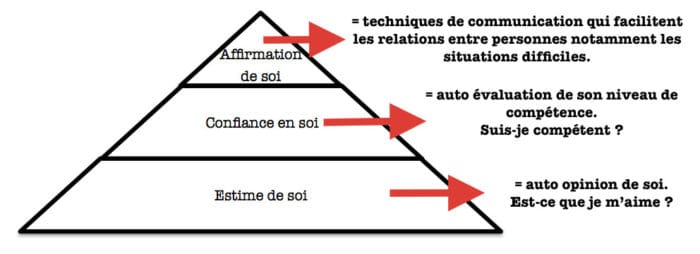Assertiveness, why bother?
Assertiveness is a very useful concept in order to understand some of the difficulties we can fall into.
Assertiveness is part of a larger whole called self-esteem.
There are 4 main relational areas of assertiveness.
1 – Basic social relationships: Assertiveness is for examples, knowing how to ask the time from someone on the street, a piece of information from a stranger, a change of appointment at the dentist’s secretary or at the garage…
2 – Friendships and professional relationships: Perhaps saying no to a colleague you like because you are not available to help or inviting someone from the sports club to an outing?
3 – Friendships: Difficulties of assertiveness can be for examples, always playing the role of a good friend by accepting everything, or by the inability to express disagreement without fear of rejection and the reaction of the other.
4 – Intimate relationships: It’s the relationships of a couple, with our parents, our children… How do you ask for support from your husband, your wife? How do you ask your husband to confide a little more about his feelings?
These 4 main areas can be impacted by a lack of assertiveness. The problem is then generalized. However, it is also common to find that a person has no assertiveness problem in one area and encounters it in another. In this case, the assertiveness problem is then localized to one or two areas of relational life.

Assertiveness is part of a whole composition of self-esteem, self-confidence and self-assertion. We can think of it as a pyramid.
How will a psychologist help you ?
A psychologist will suggest Cognitive Behavioral Therapy (CBT) as a first-line treatment because it is proven to be effective in improving assertiveness.
What is the therapy approach?
Your therapist will make sure you understand your assertiveness problem(s). In which relational areas do they express ? How do they manifest themselves? How do you feel, what do you think, what emotional state are you in when the problem arises? Each time, he will start from a concrete situation that has happened to you to unroll the thread and work with you on realistic tracks that will allow you to better assert yourself. Be prepared to do exercises and simulations during the session… It’s an action-based therapy.
If there are several situations to work through, it will always start from the simplest, least involving, least difficult situation for you, and gradually you will increase the difficulty level as your interpersonal skills evolve. For example, if you don’t know how to say no and assert yourself, it is common that you learn in therapy to do so with the local shopkeeper and then only afterwards with the people you love.

How can I help you ?
We will identify situations that are difficult for you regarding assertiveness. We will choose one to improve your assertiveness skills. We will work on concrete aspects of daily life. I will train you so that your communication is more assertive. This will affect your self-esteem and self-confidence
Liens amis
Le guide d’affirmation de soi du site TCC Montréal de Louis Chaloult, Jean Goulet et Thanh-Lan Ngô
Bibliographie
Pour les patients








Pour les thérapeutes




